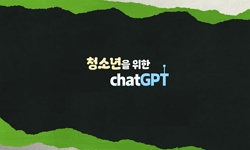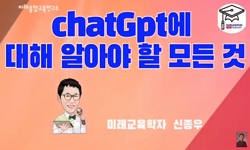Recently, generative AI could create new information and contents similar to the real, and the AI interacts like humans. The investigation of teaching and learning is essential to use generative AI in education. Therefore researchers performed a liter...
http://chineseinput.net/에서 pinyin(병음)방식으로 중국어를 변환할 수 있습니다.
변환된 중국어를 복사하여 사용하시면 됩니다.
- 中文 을 입력하시려면 zhongwen을 입력하시고 space를누르시면됩니다.
- 北京 을 입력하시려면 beijing을 입력하시고 space를 누르시면 됩니다.

생성적 인공지능의 교육적 활용 방안 탐색: 생물학습을 위한 ChatGPT 활용을 중심으로 = An Investigation of Generative AI in Educational Application: Focusing on the Usage of ChatGPT for Learning Biology
한글로보기https://www.riss.kr/link?id=A108540593
- 저자
- 발행기관
- 학술지명
- 권호사항
-
발행연도
2023
-
작성언어
Korean
- 주제어
-
등재정보
KCI등재
-
자료형태
학술저널
-
수록면
1-17(17쪽)
- DOI식별코드
- 제공처
-
0
상세조회 -
0
다운로드
부가정보
다국어 초록 (Multilingual Abstract)
Recently, generative AI could create new information and contents similar to the real, and the AI interacts like humans. The investigation of teaching and learning is essential to use generative AI in education. Therefore researchers performed a literature review of the characteristics and types of generative AI for the guide and direction of the educational application. ChatGPT is a representative example of generative AI, and it is an unsupervised learning model based on GPT(a deep learning-based language model). It can generate output like humans from pre-learned big data and experience similar to the teacher and student interaction. In particular, life science targets living organisms and must consider multidimensional perspectives. Therefore generative AI can use as an assistance tool for concept learning and inquiry activities in biology education. According to the theoretical considerations and use cases presented above, it was possible to learn with the help of generative AI without experts to verify learners' intuition concepts, inquiry performance, maintain safety, analysis of results, and etc. Researchers present a teaching-learning model using generative AI based on a literature review and examples for biological concept learning and inquiry activities using ChatGPT. It is necessary to shift the evaluation method from quantitative to qualitative to utilize generative AI. Also, it is essential to present a strategy for teaching and learning using AI in consideration of ethical aspects and to develop learners' decision-making capabilities.
참고문헌 (Reference)
1 홍옥수 ; 장진아 ; 임인숙, "인공지능, 사물인터넷, 빅데이터, 확장현실 기술을 활용한 과학탐구의 특징: IDEA형 과학교사연구회를 중심으로" 한국현장과학교육학회 15 (15): 407-422, 2021
2 장진아 ; 박준형 ; 박지선, "인공지능 챗봇 관련 국내 연구 동향 및 챗봇 활용 현황 분석: 과학 교육에서의 활용을 위한 시사점을 중심으로" 학습자중심교과교육학회 21 (21): 729-743, 2021
3 Hwang, G. J., "Vision, challenges, roles and research issues of artificial intelligence in education" 1 : 2020
4 Bonfield, C. A., "Transformation or evolution?:Education 4.0, teaching and learning in the digital age" 5 : 223-246, 2020
5 Chatterjee, J., "This new conversational AI model can be your friend, philosopher, and guide and even your worst enemy" 4 : 1-3, 2023
6 Mayr, E. W., "This Is Biology: The Science of the Living World" Harvard University Press 1997
7 Shamir, G., "Teaching machine learning in elementary school" 31 : 100415-, 2022
8 World Economic Forum, "Platform for Shaping the Future of the New Economy and Society: Schools of the Future: Defining New Models of Education" 2020
9 Oord, A. V., "Pixel Recurrent Neural Networks"
10 Kung T. H., "Performance of ChatGPT on USMLE:Potential for AI-assisted medical education using large language models" 2 : e0000198-, 2023
1 홍옥수 ; 장진아 ; 임인숙, "인공지능, 사물인터넷, 빅데이터, 확장현실 기술을 활용한 과학탐구의 특징: IDEA형 과학교사연구회를 중심으로" 한국현장과학교육학회 15 (15): 407-422, 2021
2 장진아 ; 박준형 ; 박지선, "인공지능 챗봇 관련 국내 연구 동향 및 챗봇 활용 현황 분석: 과학 교육에서의 활용을 위한 시사점을 중심으로" 학습자중심교과교육학회 21 (21): 729-743, 2021
3 Hwang, G. J., "Vision, challenges, roles and research issues of artificial intelligence in education" 1 : 2020
4 Bonfield, C. A., "Transformation or evolution?:Education 4.0, teaching and learning in the digital age" 5 : 223-246, 2020
5 Chatterjee, J., "This new conversational AI model can be your friend, philosopher, and guide and even your worst enemy" 4 : 1-3, 2023
6 Mayr, E. W., "This Is Biology: The Science of the Living World" Harvard University Press 1997
7 Shamir, G., "Teaching machine learning in elementary school" 31 : 100415-, 2022
8 World Economic Forum, "Platform for Shaping the Future of the New Economy and Society: Schools of the Future: Defining New Models of Education" 2020
9 Oord, A. V., "Pixel Recurrent Neural Networks"
10 Kung T. H., "Performance of ChatGPT on USMLE:Potential for AI-assisted medical education using large language models" 2 : e0000198-, 2023
11 O'Connor, S., "Open artificial intelligence platforms in nursing education: Tools for academic progress or abuse?" 66 : 103537-, 2022
12 Vincent-Lancrin, S., "OECD Digital Education Outlook 2021: Pushing the Frontiers with Artificial Intelligence, Blockchain and Robots" OECD Publishing 21-47, 2021
13 Singer, U., "Make-A-Video: Text-to-Video Generation without Text-Video Data"
14 Menon, H. K. D., "Machine learning approaches in education" 43 : 3470-3480, 2021
15 Radford, A., "Learning Transferable Visual Models From Natural Language Supervision"
16 UNESCO, "K-12 AI Curricula: A Mapping of Government-endorsed AI Curricula" UNESCO Publishing 2022
17 Yang, S. J. H., "Human-centered artificial intelligence in education:Seeing the invisible through the visible" 2 : 110008-, 2021
18 Ramesh, A., "Hierarchical Text-Conditional Image Generation with CLIP Latents"
19 Google, "Google Trends"
20 Wu, A. N., "Generative adversarial networks in the built environment:A comprehensive review of the application of GANs across data types and scales" 223 : 109477-, 2022
21 Goodfellow, I. J., "Generative adversarial networks" 63 : 139-144, 2020
22 Goodfellow, I. J., "Generative Adversarial Nets"
23 Lim, W. M., "Generative AI and the future of education: Ragnarök or reformation? A paradoxical perspective from management educators" 21 : 100790-, 2023
24 Bommarito, M. J., "GPT Takes the B,.ar Exam"
25 Haderer, B., "Education 4.0: Artificial intelligence assisted task-and time planning system" 200 : 1328-1377, 2022
26 Molenaar, I., "Digital Education Outlook 2021: Pushing the Frontiers with Artificial Intelligence, Blockchain and Robots" OECD Publishing 57-77, 2021
27 Bretag, T., "Contract cheating: A survey of Australian university students" 44 : 1837-1856, 2019
28 Ministry of Education, "Comprehensive Plan for Fostering Digital Talent" 2022
29 OpenAI, "ChatGPT: Optimizing Language Models for Dialogue"
30 Okaibedi, D., "ChatGPT and the rise of generative AI: Threat to academic integrity?" 13 : 100060-, 2023
31 Kingma, D. P., "Auto-Encoding Variational Bayes"
32 Sairete, A., "Artificial intelligence:Towards digital transformation of life, work, and education" 194 : 1-8, 2021
33 Guan, C., "Artificial intelligence innovation in education: A twenty-year datadriven historical analysis" 4 : 134-147, 2020
34 Ouyang, F., "Artificial intelligence in education: The three paradigms" 2 : 100020-, 2020
35 Su, J., "Artificial intelligence in early childhood education: A scoping review" 3 : 100049-, 2022
36 OECD, "Artificial Intelligence in Society" OECD Publishing Paris 2019
37 Adams, D., "Artificial Intelligence in Higher Education" Boca Raton 169-184, 2022
38 Holmes, W., "Artificial Intelligence in Education: Promise and Implications for Teaching and Learning" Center for Curriculum Redesign 2019
39 Henlein, M., "A brief history of AI: On the past, present, and future of artificial intelligence" 61 : 5-14, 2019
40 Preeti, Kumar, M., "A GAN-based model of deepfake detection in social media" 218 : 2153-2162, 2023
동일학술지(권/호) 다른 논문
-
메이커 교육 기반의 STEM 프로그램이 중학생의 학습 동기 및 STEM 태도에 미치는 영향
- 한국교원대학교 뇌기반교육연구소
- 홍대화
- 2023
- KCI등재
-
가상조작물 기반의 순차적 교수가 발달장애학생의 분수 덧셈 학습에 미치는 효과
- 한국교원대학교 뇌기반교육연구소
- 박지윤
- 2023
- KCI등재
-
2015 개정 과학과 교육과정의 생명과학Ⅰ에 제시된 탐구 활동의 적합성
- 한국교원대학교 뇌기반교육연구소
- 김용춘
- 2023
- KCI등재
-
진단분류모형을 활용한 중학생의 읽기 동기 프로파일 연구
- 한국교원대학교 뇌기반교육연구소
- 사민선
- 2023
- KCI등재
분석정보
연관 공개강의(KOCW)
-

[제18회 김옥길기념강좌] 인공지능, 감정, 휴머니즘(Human-Compatible Artificial Intelligence’)’
이화여자대학교 스튜어드 러셀 -

청소년을 위한 ChatGPT
원광대학교 소인미, 반창모, 김영애 -

누구나 할 수 있는 데이터 분석과 인공지능[Data Analysis and Artificial Intelligence for Everyone]
K-MOOC 인하공업전문대학 이세훈 -

누구나 할 수 있는 데이터 분석과 인공지능[Data Analysis and Artificial Intelligence for Everyone]
K-MOOC 인하공업전문대학 이세훈 -

ChatGpt에 대해 알아야 할 모든 것
신한대학교 신종우




 KCI
KCI 스콜라
스콜라

